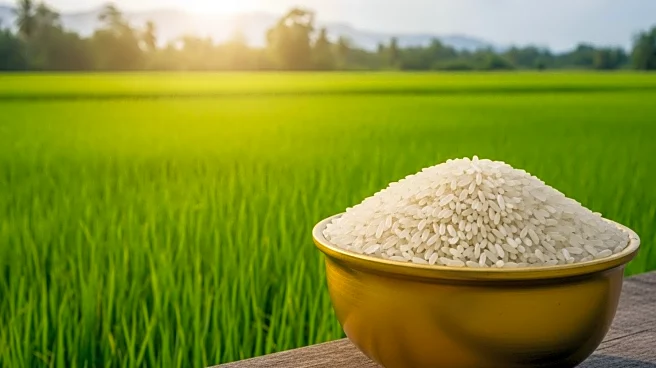What's Happening?
President Ratu Naiqama Lalabalavu has raised concerns regarding the effectiveness of a $150,000 investment by Fiji Rice Limited aimed at enhancing rice self-sufficiency in Fiji. During the Rice Farmers President Awards 2024, he emphasized the importance of agriculture to Fiji's economy and the need to reduce rice imports for better food security and economic stability. The President urged the Ministry of Agriculture, industry leaders, and farmers to develop practical solutions to expand rice farming and achieve agricultural independence. Minister for Environment and Climate Change, Mosese Bulitavu, highlighted ongoing efforts to address climate impacts on farming, including securing international funding for climate-smart agriculture. Minister for Agriculture Tomasi Tunabuna noted that rice is vital to Fiji's food security and cultural identity, with significant imports costing the nation $42 million in 2022.
Why It's Important?
The President's concerns underscore the critical role of agriculture in Fiji's economy and the challenges faced in achieving self-sufficiency in rice production. With 88% of rice being imported, Fiji is vulnerable to global price fluctuations, impacting food security and economic stability. The government's focus on climate-smart agriculture and modern farming techniques aims to mitigate these risks and enhance local production. Success in these initiatives could lead to reduced dependency on imports, improved food security, and economic resilience. The involvement of multiple ministries and international funding highlights the complexity and importance of addressing agricultural challenges in Fiji.
What's Next?
The President's call for action may prompt further collaboration between government agencies, industry leaders, and farmers to develop and implement strategies for increasing rice production. The Ministry of Agriculture's initiatives, including training and mechanization, are expected to continue, potentially leading to increased local production and reduced import dependency. Stakeholders may also explore additional funding opportunities and partnerships to support climate-smart agriculture and address environmental challenges affecting rice farming.
Beyond the Headlines
The emphasis on rice self-sufficiency reflects broader concerns about food security and economic independence in Fiji. The challenges faced by farmers, such as droughts and changing rainfall patterns, highlight the need for sustainable agricultural practices and climate adaptation strategies. The government's efforts to secure international funding for climate-smart agriculture may also contribute to long-term environmental and economic benefits, fostering resilience against climate change impacts.










